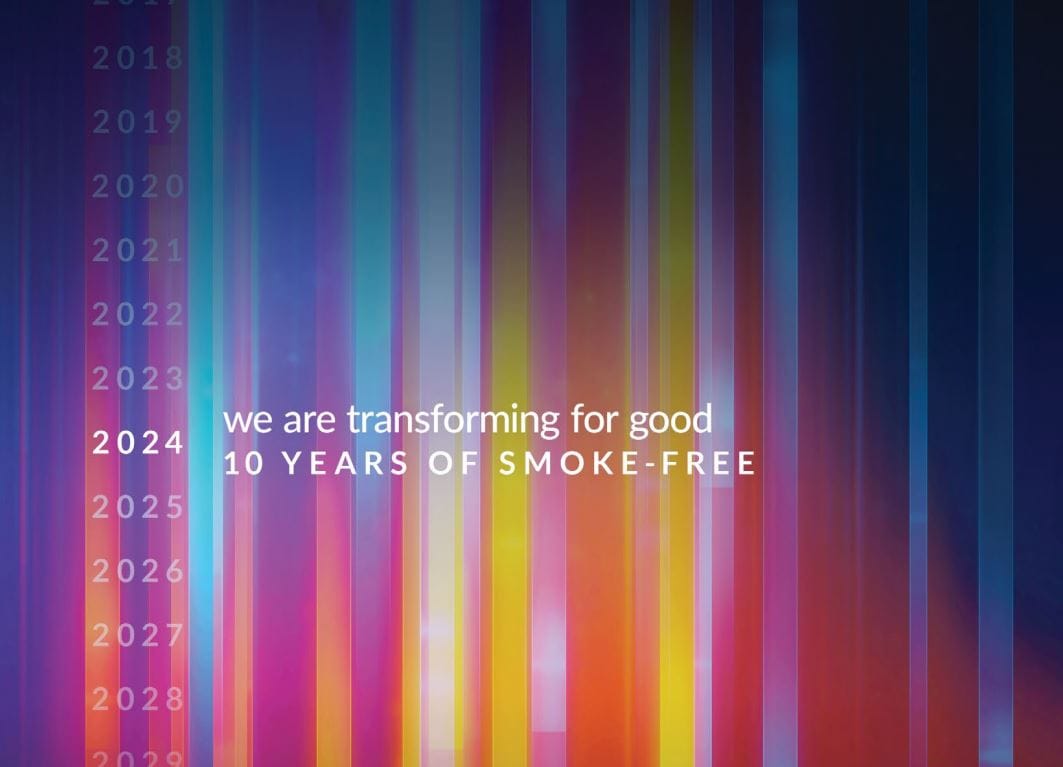As I reflect on our journey in 2024, I am humbled by and proud of the progress we have made. Many might view the pairing of tobacco and sustainability as paradoxical, yet this perceived contradiction is precisely what makes our actions impactful and our story so compelling. Sustainability for us is an opportunity to transform our industry from within, proving that positive change can emerge from unexpected places. By combining deep expertise, talent, and dedication we are demonstrating how a company can evolve to create lasting positive impact for consumers, society, and the planet.
The increasing complexity of sustainability challenges requires dedicated people working together to achieve systems change. The launch of PMI DNA this year has further energized our journey, resonating deeply with our strategy and ways of working—where passionate teams are empowered to challenge conventional thinking and drive meaningful impact. Our company’s transformation transcends how and what we do; it defines who we are becoming. Indeed, sustainability is the heart of our business strategy.
In 2024, we continued strengthening this commitment through concrete actions. We completed a comprehensive sustainability materiality assessment, following the principles of double materiality, aligned with the EU Corporate Sustainability Reporting Directive (CSRD). Its outcome has informed our first CSRD statement to be issued by our Czech affiliate shortly after the publication of this Integrated Report, setting a strong precedent for our company’s broader application of the directive.
Built on the learnings of the exercise we completed in 2021, this recent assessment provided us with deeper insights into our understanding of those sustainability-related impacts, risks, and opportunities that are material for our company. While some information about this new sustainability materiality assessment can be found in this report, we plan to provide our stakeholders more details about its process and outcome in the course of 2025, as well as in our next Report.
Our approach to nonfinancial reporting and performance management continues to become more sophisticated. During 2024, working closely with our risk functions, we strengthened our non-financial data governance, quality, and controls. New technologies and automation are helping us enhance our capability to collect and verify data with increased accuracy and efficiency, helping to ensure that information collected and reported is precise and consistent. Moving forward, we expect this work will allow us to continue reducing the effort required for reporting, lowering costs and facilitating compliance to meet regulatory and external assurance requirements.
In an environment where many companies are scaling back their sustainability goals, we understand the importance of setting ambitious yet realistic targets, relevant to our business transformation. The strong governance and processes we have put in place to carefully balance aspiration with achievability ensure that our goals are both meaningful and within our sphere of influence, accounting for external factors beyond our direct control. Our commitment to this is exemplified by our Sustainability Index, which we developed in 2021 and introduced in 2022. This groundbreaking instrument not only accelerated learnings associated with measuring performance, but also instilled necessary discipline in target-setting. The Index has proven instrumental in ensuring our ambitions are balanced and metrics are objective, clear, and verifiable, serving as a stepping stone toward building an increasingly robust approach to sustainability.
This year, we introduced our third Sustainability Index, linked to PMI’s 2024–26 performance shared unit (PSU) cycle. We continued to refine the structure of the Index in a way that accurately reflects our business priorities. Still consistent with the outcome of our 2021 sustainability materiality assessment, changes introduced reflect the transition from our 2025 Roadmap to longer-term 2030 aspirations, emphasizing a more strategic approach that will focus on fewer, more impactful indicators aligned with our evolving business priorities. We have also retired, introduced, and refined several existing KPIs with more targeted indicators to reflect program maturity.
At the core of our company’s purpose lies the commitment to drive systemic change—a trait that is deeply intertwined with the essence of sustainability. We recognize that this is an inherently complex endeavor, as it requires the collaborative effort of multiple stakeholders. Yet we remain determined to be a catalyst for positive change, by focusing on those areas within our control and influence, where we can make a tangible impact and also contribute to a broader transformation that is not dependent on us alone.
We welcome all forms of engagement and see each constructive challenge and thoughtful skepticism as an opportunity to inform our work and to demonstrate our commitment through action. Our stakeholders’ diverse perspectives help us identify blind spots and ultimately ensure we never forget that our actions today will shape the world of tomorrow. Looking into the future, we are excited to start planning beyond 2025: We will leverage the insights gained from our recently completed sustainability materiality assessment to shape our new strategy, ensuring that our pursuit of business success and our commitment to driving positive change remain inseparable.
This letter is an excerpt from PMI’s Integrated Report 2024
This online content about our Integrated Report should be read in conjunction with PMI’s Integrated Report 2024. This report includes metrics that are subject to uncertainties due to inherent limitations in the nature and methods for data collection and measurement. The precision of different collection and measurement techniques may also vary. This report includes data or information obtained from external sources or third parties. Unless otherwise indicated, the data contained herein cover our operations worldwide for the full calendar year 2024 or reflect the status as of December 31, 2024. Where not specified, data comes from PMI financials, nonfinancials, or estimates.
Unless explicitly stated, the data, information, and aspirations in this report do not incorporate PMI’s wellness and healthcare business, Aspeya. Regarding the Swedish Match acquisition, completed late 2022, unless otherwise indicated, this report includes information pertaining to its sustainability performance. Please also refer to "This report at a glance" on page 2 of the PMI’s Integrated Report 2024 for more information. Aspirational targets and goals do not constitute financial projections, and achievement of future results is subject to risks, uncertainties and inaccurate assumptions, as outlined in our forward-looking and cautionary statements on page 206. In PMI’s Integrated Report 2024 and in related communications, the terms “materiality,” “material,” and similar terms are defined in the referenced sustainability standards and are not meant to correspond to the concept of materiality under the U.S. securities laws and/or disclosures required by the U.S. Securities and Exchange Commission.



